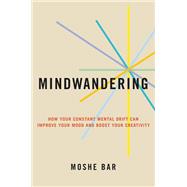
Mindwandering How Your Constant Mental Drift Can Improve Your Mood and Boost Your Creativity
by Bar, Moshe-

Free Shipping On All Orders!*
Free economy shipping applies to all orders shipped to residential addresses. Orders shipped to campus receive free standard shipping. Free shipping offers do not apply to Marketplace items.
Buy New
Rent Book
Used Book
We're Sorry
Sold Out
eBook
We're Sorry
Not Available
How Marketplace Works:
- This item is offered by an independent seller and not shipped from our warehouse
- Item details like edition and cover design may differ from our description; see seller's comments before ordering.
- Sellers much confirm and ship within two business days; otherwise, the order will be cancelled and refunded.
- Marketplace purchases cannot be returned to eCampus.com. Contact the seller directly for inquiries; if no response within two days, contact customer service.
- Additional shipping costs apply to Marketplace purchases. Review shipping costs at checkout.
Summary
Research has revealed that our brains are inherently noisy. A number of brain regions connected in what’s dubbed the Default Mode Network (DMN) are always grinding away, engaged in a number of different involuntary activities that neuroscientists collectively call mindwandering: from daydreaming and self-chatter to ruminating about the past and worrying about the future. Not only does all of this inner commotion tug our attention away from the present moment, but it can dampen the quality of our experience, lowering our mood and potentially contributing to anxiety and depression. Yet, there’s method to this apparent madness.
Mindwandering is our brain's way of developing our sense of self, trying to sort out what others are thinking, and searching for associations to help us interpret what's happening in our lives. It can be both positive and negative. On one hand, can become so engaged in this consideration of the past and making predictions about the future that for much of the time we are disconnected from what is actually happening in the moment. On the other, we can become more aware of where our minds are wandering, learning to direct them to stimulate creative, increase our ability to focus, and boost our mood. We want, in short, to work toward being able to bring the right mind to the right time.
Mindwandering is the first book to expose readers to the multi-faceted phenomenon of their wandering minds, the new and exciting research of the brain and the mind behind this default mode of ours, when it is beneficial and when it is harming us to wander, and how we can gain some control over our mental lives. In doing so, Mindwandering will bring to readers the rare and marvelous convergence of advanced neuroscience with ancient wisdom; cognitive psychology with creativity and mood; and the brain’s default state linked to the quality of our daily experience.
Author Biography
An electronic version of this book is available through VitalSource.
This book is viewable on PC, Mac, iPhone, iPad, iPod Touch, and most smartphones.
By purchasing, you will be able to view this book online, as well as download it, for the chosen number of days.
Digital License
You are licensing a digital product for a set duration. Durations are set forth in the product description, with "Lifetime" typically meaning five (5) years of online access and permanent download to a supported device. All licenses are non-transferable.
More details can be found here.
A downloadable version of this book is available through the eCampus Reader or compatible Adobe readers.
Applications are available on iOS, Android, PC, Mac, and Windows Mobile platforms.
Please view the compatibility matrix prior to purchase.
